Welcome back!
Last week I returned from the ad limina visit to the Holy Father in Rome. As you can read in my post last week, it was a very significant visit and I was very happy to meet the Holy Father together with the other bishops from New England and to celebrate the Eucharist at the tombs of Sts. Peter and Paul.
This week I published a Pastoral Letter on the importance of Sunday Mass, “Jesus’ Eager Desire: Our Participation in the Sunday Mass.” It is a continuation of our efforts in evangelization that began recently with the “Catholics Come Home” initiative during Lent being followed by the Pastoral Letter on Evangelization that I published on the Solemnity of Pentecost.
The centerpiece of Evangelization is, of course, to invite people to a renewed fidelity to the Sunday Eucharist. In light of the new Roman Missal, it’s a time to reintroduce people to the liturgy and the centrality of the Sunday Eucharist. Christ has given us this great gift and He has commanded us to do this in memory of Him, in commemoration of Him, and to make holy the Lord’s Day by being part of a worshiping community. And so, I hope the letter will create an opportunity for our priests and parish leadership to reflect on our mission to evangelize and to build up our Sunday Eucharist as the center of our lives. You can read the letter at the end of this post.
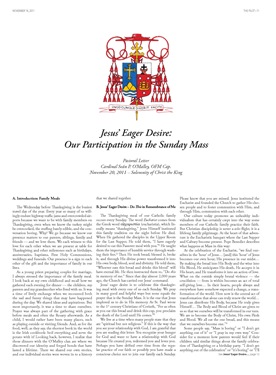
– – –
On my return to Boston, I was visited by Bishop Launay Saturne of the Diocese of Jacmel, Haiti. He was accompanied by Father Jean Pierre Aubin and Father Michael Nolan.
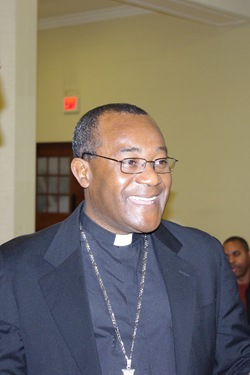
Bishop Saturne was visiting the Parish of Saint Mary in Waltham which is helping rebuild Saint Peter’s Church in the Jacmel Diocese.
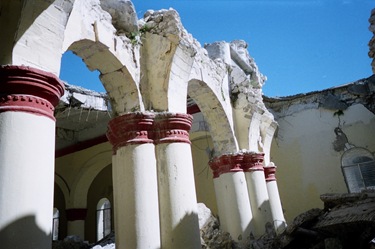
Saint Peter’s Church
Jacmel was one of the hardest hit parts of Haiti. Bishop Launay was made bishop after the earthquake to guide the spiritual and physical reconstruction efforts of that diocese.
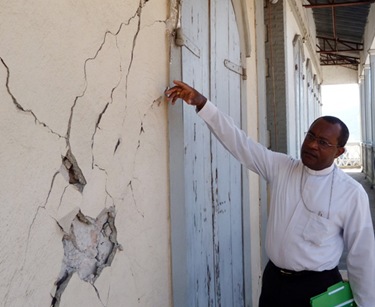
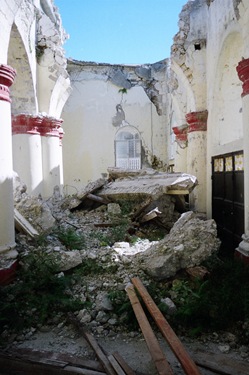
Father Jean Pierre is a priest of the Archdiocese of Boston who was born in Haiti and was baptized at Saint Peter’s.
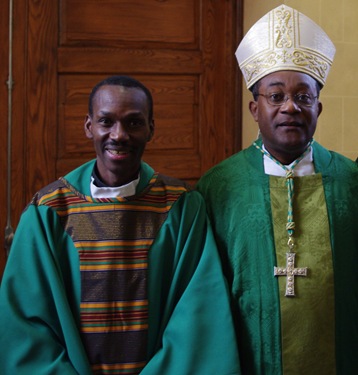
He currently serves as parochial vicar at Saint Bridget’s in Maynard and ministers to the Haitian community in Waltham. Saint Mary’s is trying to help this parish in their rebuilding efforts in gratitude for providing Boston with a priest. Bishop Launay visited with many of the faithful including representatives of the Propagation of the Faith Office while here. He expressed his gratitude to me that as we approach the two year anniversary of the earthquake, the people of Boston have not forgotten the church and people of Haiti.
– – –
Friday, we went to Philadelphia for a fundraiser for the Catholic Leadership Institute. I was one of the honorees.
At the gala dinner they also honored Thomas Monaghan, Founder of Legatus and Ave Maria University; Theresa Polakovic, Co-founder, Executive Director and Chief Editor of Endow; and Sister Polly McShain, SHCJ, Educator, Counselor and Sister of the Society of the Holy Child Jesus.
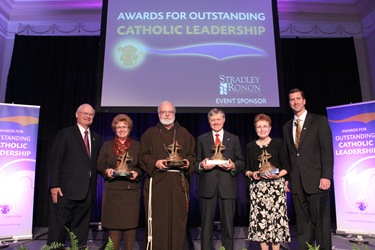
I was very happy to be a part of their evening, and to support the extraordinary work to promote pastoral leadership formation among our leaders in the Church, both among our priests and the laity.
Their “Good Leaders, Good Shepherds” program for clergy and “Tending the Talents” program for lay leaders have been very successful in our archdiocese.
At the event there were a number of my friends from Palm Beach, including Father Brian Flannigan. He was the pastor of St. Patrick’s in Palm Beach where I was a bishop for less than one year. Father Flanagan is the brotehr of CLI’s founder Tim Flanagan
One of the parishioners from there, Dianne Simouitz, was very active in the diocese. They had about 600 people at the banquet.

With Al Lagan and Tim Flanagan
They had a very beautiful program that allowed them the chance to talk about the fine works that they’re doing. I am very pleased with their contribution to the Church throughout the country.
– – –
The following morning I travelled to Baltimore for the fall session of the Bishops’ conference. Even though the conference starts officially on Monday, during the weekend I had to participate in meetings with several committees I am part of, including the Clergy, Consecrated Life, and Vocations Committee as well as the Latin American Secretariat.
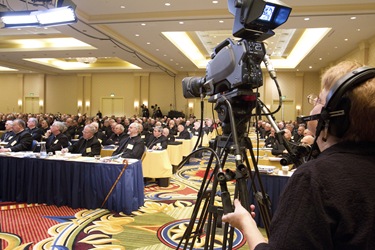
During the conference we had the opportunity to welcome the Archbishop Carlo Maria Vigano, the new apostolic nuncio to the United States. I had already have a chance to meet him the week before in Rome.
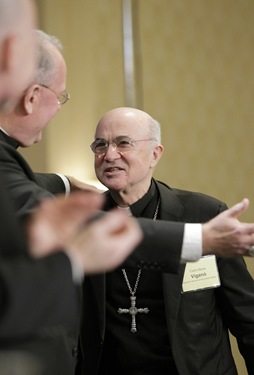
Archbishop Dolan welcomes Archbishop Vigano
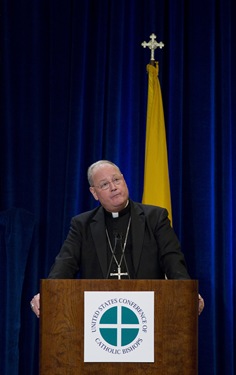
Archbishop Dolan gave a very inspiring Presidential Address
on the ministry of bishops.
I would say the centerpiece of the meeting was Archbishop Lori’s presentation on the priority to deal with issues of religious freedom that was very strongly endorsed by all of the bishops.
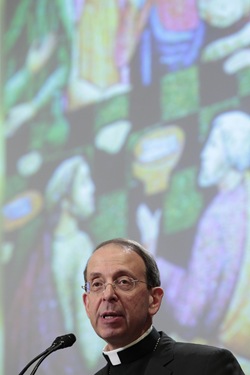
It was a very positive meeting. I was asked also to make a presentation on the ad limina because the last time it took place was seven years ago and many bishops have not experienced it yet. Archbishop Dolan asked me to make a presentation to the bishops, so that they would have an idea of what to expect.
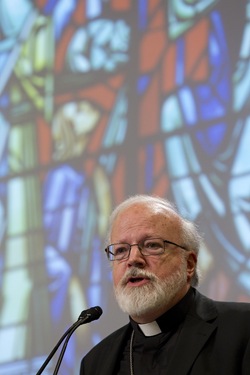
We were glad to be part of the presentation on Monday morning on Project Rachel together with Cardinal Wuerl and Cardinal Dinardo, who is the chairman of the pro-life committee. Our purpose was to inform the bishops of the ministry of Project Rachel, and to encourage the dioceses throughout the country, that might not have this initiative, to become aware of it and hopefully adopt it. There are so many women and men that have been affected by the trauma of abortion. It’s such a wonderful way of having a ministry of reconciliation and healing for that.
Marianne Luthin, our director of our Pro-Life Office in Boston was there, and she was one of the principal presenters at the press conference that took place on Tuesday.
During the conference I was elected chairman of the Pro-Life Committee, although my role will start officially one year from now when Cardinal DiNardo’s term will end. This system allows for a smooth transition.
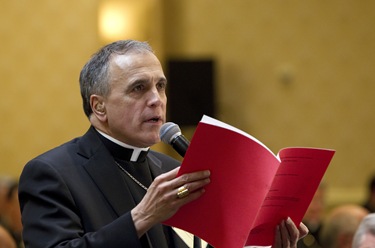
Cardinal Dinardo
I’ve always felt humbled by the confidence of my brother bishops. This is certainly a very important committee for all of us. It represents the centerpiece of the social gospel of the church. In the United States there are so many threats to the gospel of life. I’m very pleased that the bishops’ conference has an outstanding team of staff members, who preserve the committee.
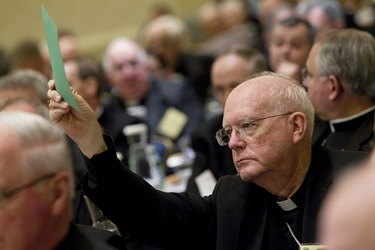
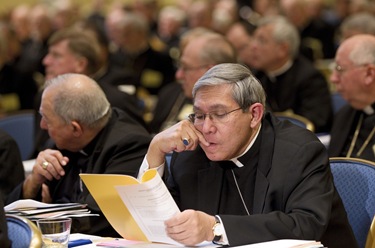
The Archbishop for the Ukranian Catholics, Bishop Sviatoslav Shevchuk, one of the largest rite churches within the Catholic Church was present at our meeting of the bishops. He thanked the bishops and all American Catholics for all their support as the Church in Ukraine had to go through the darkest years of persecution. We were very happy to see him.
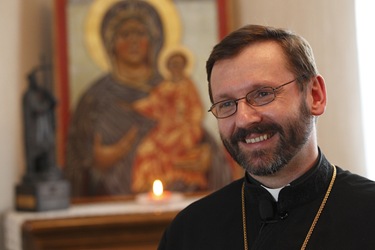
I would want to mention that while we were there we were told of the death of Archbishop John Francis Donoghue, the Bishop Emeritus of Atlanta.
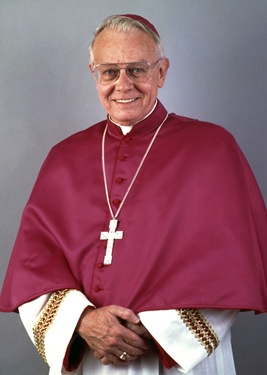
He was a very good friend of mine. When I was a young priest in Washington, he was the chancellor of the archdiocese. He served as chancellor under Cardinals Boyle, Baum, and Hickey, and then he became the Archbishop of Atlanta. I expressed my condolences to Archbishop Gregory and assured him of our prayers.
Each year, the military archdiocese sponsors a dinner with the chief of chaplains.
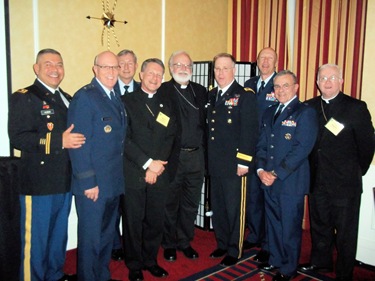
From left to right: Father Tim Hubbs, Chaplain Cecil Richardson (Chief of Air Force Chaplains), Father Red Raux (Air Force chaplain and priest of the Archdiocese of Boston), Archbishop Timothy P. Broglio (Archdiocese for the Military Services USA), Msgr. Donald Rutherford (Chief of Army Chaplains), Chaplain Howard Stendahl (Deputy Chief of Air Force Chaplains), Msgr. Alfonse Stephenson (Chief of Chaplains, Air National Guard) and auxiliary Bishop Richard Higgins (Archdiocese for the Military Services)
Boston, of course, is one of the archdioceses with the largest number of priests in the military. I was happy to be a part of that. They had some entertainment during the meal. Afterwards, there was a video presentation that I was able to see.
– – –
Finally, as I mentioned, I conclude this post with the text of my Pastoral Letter, Jesus’ Eager Desire: Our Participation in the Sunday Mass . You can download the letter here.
Until my next post.
Cardinal Seán
Jesus’ Eager Desire: Our Participation in the Sunday Mass
Pastoral Letter
Cardinal Seán P. O’Malley, OFM Cap.
November 20, 2011 Solemnity of Christ the King
A. Introduction: Family Meals
The Wednesday before Thanksgiving is the busiest travel day of the year. Every year so many of us willingly endure highway traffic jams and overcrowded airports because we want to be with family members on Thanksgiving, even when we know the turkey might be overcooked, the stuffing barely edible, and the conversation boring. Why? We go because we know our presence matters to our parents, siblings, family and friends — and we love them. We each witness to this love for each other when we are present at table for Thanksgiving and other milestones such as birthdays, anniversaries, baptisms, First Holy Communions, weddings and funerals. Our presence is a sign to each other of the gift and the importance of family in our lives.
As a young priest preparing couples for marriage, I always stressed the importance of the family meal. I look back at my own childhood and recall how we gathered each evening for dinner — the children, my parents and my grandmother who lived with us. It was a time of lively exchange when we recounted both the sad and funny things that may have happened during the day. We shared ideas and aspirations. But most importantly, it was a time to share ourselves. Prayer was always part of the gathering with grace before meals and often the Rosary afterwards. As a child, I would rather have been many places, such as playing outside or visiting friends. And, as for the food, well, as they say, the shortest book in the world is the Irish cookbook: boil everything and serve the potato with it! Looking back, however, I realize that those dinners with the O’Malley clan are where we discovered our identity and forged bonds that have lasted a lifetime. There we shared our own stories, and our individual stories were woven in to a history that we shared together.
B. Jesus’ Eager Desire — Do This in Remembrance of Me
The Thanksgiving meal of our Catholic family occurs every Sunday. The word Eucharist comes from the Greek word e ?a??st?a (eucharistia), which literally means "thanksgiving." Jesus Himself instituted this family tradition on the night before He died. When He gathered the disciples in the Upper Room for the Last Supper, He told them, "I have eagerly desired to eat this Passover meal with you."1 He taught them the importance of humble service through washing their feet.2 Then He took bread, blessed it, broke it, and through His divine power transformed it into His own body, blood, soul and divinity. He told them, "Whoever eats this bread and drinks this blood" will have eternal life. He then instructed them to, "Do this in memory of me." Since that day almost 2,000 years ago, the Church has carried out Jesus’ command.
Jesus’ eager desire is to celebrate this thanksgiving meal with every one of us each Sunday. We pray in many good and helpful ways but none equals the prayer that is the Sunday Mass. It is the one that Jesus implored us to do in His memory. As St. Paul wrote to the 1st century Christians of Corinth, "For as often as you eat this bread and drink this cup, you proclaim the death of the Lord until He comes."3
We live at a time when many people state that they are "spiritual but not religious." If this is the way that you see your relationship with God, I am grateful that you are reading this letter. You recognize your hunger for God and want to have a relationship with God because He created you, redeemed you and loves you. Perhaps you have drifted over time from the regular practice of our faith or possibly you have made a conscious choice not to join our family each Sunday. Please know that you are missed. Jesus instituted the Eucharist and founded the Church to gather His chosen people and to foster communion with Him, and through Him, communion with each other.
Our culture today promotes an unhealthy individualism that has certainly crept into the way some members of our Catholic family practice their faith. But Christian discipleship is never a solo flight; it is a lifelong family pilgrimage. At the heart of that adventure is the Eucharistic banquet where the Last Supper and Calvary become present. Pope Benedict describes what happens at Mass in this way:
At the celebration of the Eucharist, ”we find ourselves in the ‘hour’ of Jesus… [and] this ‘hour’ of Jesus becomes our own hour; His presence in our midst… By making the bread into His Body and the wine into His Blood, He anticipates His death, He accepts it in His heart, and He transforms it into an action of love. What on the outside simply brutal violence — the crucifixion — from is within becomes an act of total self-giving love… In their hearts, people always and everywhere have somehow expected a change, a transformation of the world. Here now is the central act of transformation that alone can truly renew the world… Jesus can distribute His Body, because He truly gives Himself… The Body and Blood of Christ are given to us so that we ourselves will be transformed in our turn. We are to become the Body of Christ, His own Flesh and Blood. We all eat the one bread, and this means that we ourselves become one.”4
Some people say, "Mass is boring" or "I don’t get anything out of it" or "I pray in my own way." Consider for a moment how parents would feel if their children said similar things about the family celebration of Thanksgiving or a birthday party. "I don’t get anything out of the celebration" or "it’s boring" or "I’ll celebrate your birthday in my own way." We would feel disappointed, incomplete, and certainly hopeful that the family would be fully reunited at the next gathering. Similarly, Jesus’ eager desire is to have us all present each Sunday for His thanksgiving meal.
C. Sunday Mass: A Great Hunger Throughout the Ages
The Eucharist is Jesus’ great gift to us, and the fulfillment of His promise to be with us always until the end of time. It is a central part of God’s saving plan of infinite love for us.
Many Catholics today seem to take the gift of the Sunday Mass for granted. It is a great sadness to me as spiritual leader of the Archdiocese of Boston to note that, on any given Sunday, so many Catholics choose to be absent from Mass. It was not that long ago that almost all Catholics went to Sunday Mass unless they were sick or incapacitated.
In the early days of the Church, Christians did not enjoy the freedom of religion that we do today in the United States. They were regularly persecuted by the Roman authorities for attending Mass. Pope Benedict XVI often tells the story of the martyrs of Abitene (in modern-day Tunisia). In 303, forty-nine Christians suffered torture and martyrdom because they defied the Roman Emperor Diocletian’s order not to celebrate the Eucharist on Sunday. When asked why they had disobeyed the emperor, one of them said, "Sine dominico non possumus" — "Without Sunday, we cannot live."5
In fact, for nearly 2,000 years Christians have risked their lives to participate in Sunday Mass. During the Reformation in England, priests were martyred when caught offering Holy Mass for English Catholics. Courageous lay people who gave their homes over as places of Catholic worship, and who harbored priests, suffered torture and death.
The witness of saints in our own lifetime testifies to the tremendous price paid by some of our Catholic family for celebrating the Sunday Eucharist. In the past century, Catholics in former Communist countries like the Soviet Union or Vietnam were persecuted for practicing their faith. Today in places such as Egypt, China, North Korea, Iraq, Sudan and countless other areas, Catholics risk their lives and travel for hours to attend Sunday Mass. We give thanks to God that we do not have to put our lives in jeopardy to attend Mass at our local parish. We rejoice that, unlike those in poor areas, we do not have to walk for miles, over hills or on inadequate dirt roads to attend. The vast majority of us can walk safely down the street or make a short drive to arrive at our beloved parish. But the ease, convenience, and legality of the Mass should not cause us ever to lose sight that the Mass is so precious that many of our Catholic brothers and sisters around the world are braving great inconvenience and persecution to receive what we, by God’s love, have available near us.
In his first Holy Thursday letter to priests, Blessed Pope John Paul II touchingly recalled situations of the faith triumphing over persecution from his own personal experience of living under religious oppression:
Sometimes it happens that [the lay faithful] meet in an abandoned shrine, and place on the altar a stole which they keep, and recite all the prayers of the Eucharistic liturgy: and then, at the moment that corresponds to the transubstantiation a deep silence comes down upon them, a silence sometimes broken by a sob … so ardently do they desire to hear the words that only the lips of a priest can efficaciously utter.6
Blessed Mother Teresa of Calcutta often spoke about how precious each Mass is. Frequently she would instruct newly ordained priests to "celebrate each Mass as if it is your first Mass, your last Mass and your only Mass." In other words, she implored priests never to take the celebration of the Mass for granted and let it become routine. I ask the same of every Catholic in the archdiocese. Just as we should be grateful for each day God grants us, let us anticipate and participate in each Mass as if it could be our last or our only Mass. Let us never take for granted the wonder that is the encounter we have with God each Sunday that we celebrate the Eucharist together.
D. Why Catholics Come to Mass
Sometimes we become fixated on the reasons Catholics give for skipping Sunday Mass. These are important and the Church needs to hear these concerns and respond. However, it is equally important to focus on and share the many reasons why Catholics throughout the Church’s history have come, and continue to come, with eager anticipation.
1. We desire to respond to God’s love
"God so loved the world that He sent His only son so that whoever believes in Him should not perish but have eternal life."7 Jesus’ love for us led Him to offer Himself on the cross for our salvation. The same saving love of Jesus leads Him to continue to give Himself through the gift of the Eucharist.
The word "love" in English, particularly today, has been stripped of much of its beauty and meaning. It often is reduced to a "feeling." In Greek, there are seven words for love and the word for the love God has for us, agape, connotes action, a self-gift. The love we want to have for God is a self-gift in return, of our time, energy, worries, hopes and joy. The Mass is the best place to thank God for the gifts besides Himself that He gives us — especially life, family, friends, faith and love.
2. We desire to encounter Christ in the most profound way possible
At Mass, eternity and time intersect. It is part of God’s plan of salvation that we would be able to meet Him directly and receive His grace through the sacraments. Because He is all loving and truthful, we believe Him when He and the Church He founded teach that He is really present with us in the celebration of the Mass.
The Second Vatican Council’s Constitution on the Sacred Liturgy explains that Christ is present to us in four ways during the celebration of Mass: (1) in the community celebrating; (2) in the Word proclaimed; (3) in the priest presiding; and (4) in the Eucharist.8 Dr. Tom Curran elaborated on these four forms of Christ’s presence at Mass in a way that is very helpful.9
First, we encounter Christ in the community of the faithful. Each one of us is made in God’s image and likeness. The kindness we show each other in Jesus’ name is a way we show kindness to Jesus Himself. Also, by joining in the community of the faithful, we are included in Jesus’ prayer of thanks and praise to God the Father. It is a holy encounter with Jesus and with our fellow communicants.
Second, we encounter Christ in His Word. The readings proclaimed from Sacred Scripture are truly the words of everlasting life and the letter from a loving God to His people. What is truly amazing is that, if we pray before Mass for guidance in a decision and we intently listen to the proclamation of Scripture and the homily, God will often speak to us in words we most need to hear.
Third, we encounter Christ in the priest. Jesus chose to have His sacrifice re-presented on the altar by an ordained priest or bishop. When the priest speaks in the first person during the Consecration, and says, "Take this, all of you and eat of it, for this is My body," Jesus is speaking through him. He stands in the person of Christ, the Eternal High Priest. Through the priest, we are able to participate in the greatest event in history, the one that saved us from our sins and opened up the possibility of spending eternal life with God in heaven.
Fourth, and most importantly, we encounter Christ in the Eucharist. We take Jesus’ body and blood within us, and Jesus transforms us. We become one with Him by receiving Him in Holy Communion, and through Him, with each other.10
Because of these direct encounters with Christ at Mass, we seek to be active participants — not passive spectators — in listening to His Word, sharing in the Offertory, joining in the singing, and proclaiming a reverent "Amen" ("truly, I believe") when we worthily approach to receive Jesus in the Eucharist.
3. We desire to gather and pray with our parish family
The celebration of Mass, like life, has vertical and horizontal dimensions. This parallels the great commandment, which instructs us to love God and then to love our neighbors as ourselves.
Christian life is a pilgrimage we make with our brothers and sisters in Jesus. Jesus set the example by gathering all the Apostles at the Last Supper instead of having a dozen individual meals. God foresaw from all eternity that we would be placed in our particular community at this particular time and that discipleship is lived in friendship and fraternity with those for whom and with whom we pray at each Sunday Mass. Our presence to each other is a symbol of our solidarity and unity with God and with each other. It is the fullest expression of our Christian identity.
Liturgy means, "work of the people." The greatest work we will do each week is to worship God and pray for, and with, our parish family.
4. We desire to strengthen our particular family
Father Patrick Peyton, the great "Rosary Priest," instructed us, "The family that prays together, stays together." He advocated praying a family rosary daily. In the same way, I recommend that attending and praying at the Sunday Mass together will strengthen your family to confront the various challenges today that often tear families apart.
During the sacrament of Baptism, parents are reminded that they are called to be the first and best teachers of their children in the ways of faith. Knowing that the Mass is Catholicism’s central prayer and that it is the source and summit of Christian life, we teach our children and grandchildren one of the most important lessons of all when we attend Mass with them.
Recently I attended a dinner at which the principal of one of our local Catholic high schools was being honored. In his remarks he said: "I grew up in a family where going to Mass on Sunday was about as optional as breathing." Many of us in the audience could identify with those words — it was not a matter of authoritarian parents or social pressure, but rather a sense of how important the Sunday Eucharist was for our family identity and survival. To miss Mass is to stop breathing; it is the sure path to a spiritual asphyxiation.
5. We desire to witness to our faith and provide a living legacy to our children and grandchildren
Children are always watching their parents and grandparents. We form our young people by the way we participate in the Mass. Children who see that their parents get to Church early to pray before Mass will want to imitate them. Children who observe parents and other adults reverently receive the Eucharist will more readily realize that the Eucharist truly is the Body and Blood of Christ. The example of parents is an essential part of preparation for receiving First Holy Communion. Children who hear from their parents how much, and why, they love Mass will be less inclined to compare Mass to television and consider it "boring."
A great tribute at a funeral liturgy is when we describe the deceased as someone who never missed Sunday Mass and someone who had a great desire to receive the Eucharist and to be with the parish family. When I was growing up, my family and others in our parish would regularly attend Saturday afternoon confession together and Sunday morning Mass. Following Mass, extended families gathered for a great Sunday lunch and time for relaxation. Celebrating Sunday, the Lord’s Day, was a legacy passed from generation to generation. It was a time to build up the family of Christ, the Church, as well as our own family.
Today the pace of life has quickened. Technology allows work and other responsibilities to intrude into family time. Youth sports, which used to have distinct seasons and no games on Sunday, are now year-round activities with games beginning as early as 7:00 a.m. on Sundays.
Indeed, many families have busier, more hectic schedules on Sundays than they do during the week because Sunday has become simply part of a two-day weekend. Blessed Pope John Paul II wrote about this in his 1998 pastoral letter on the Lord’s Day.
The custom of the ‘weekend’ has become more widespread, a weekly period of respite, spent perhaps far from home and often involving participation in cultural, political or sporting activities which are usually held on free days. This social and cultural phenomenon is by no means without its positive aspects if, while respecting true values, it can contribute to people’s development and to the advancement of the life of society as a whole. All of this responds not only to the need for rest, but also to the need for celebration, which is inherent in our humanity. Unfortunately, when Sunday loses its fundamental meaning and becomes merely part of a ‘weekend’, it can happen that people stay locked within a horizon so limited that they can no longer see the heavens. Hence, though ready to celebrate, they are really incapable of doing so. The disciples of Christ, however, are asked to avoid any confusion between the celebration of Sunday, which should truly be a way of keeping the Lord’s Day holy, and the ‘weekend’, understood as a time of simple rest and relaxation.11
St. Ignatius called Christians people who "live in accord with the Lord’s Day" because they gathered on the first day of the week after the Jewish Sabbath to celebrate Christ’s Resurrection. Their lives were renewed by this sacred worship. As Pope Benedict says, Sunday is not just a suspension of ordinary activities, but a time when "Christians discover the Eucharistic form that their lives are meant to have."12 The way we celebrate Sunday will affect the way we live the remainder of the week and is a mark of Christian identity from generation to generation.
6. We desire to be transformed by Christ’s sacramental grace
The Eucharist is not just something symbolic. Jesus said: "I am the living bread that came down from heaven; if any one eats of this bread, he will live forever; … he who eats my flesh and drinks my blood has eternal life and … abides in me, and I in him."13 Upon hearing these words many disciples abandoned Jesus but He did not call them back and say, "I am just kidding," or "these are just figurative expressions." Instead He asks the Apostles if they are going to leave Him too. St. Peter answers in the name of all faithful disciples: "Lord, to whom shall we go? You have the words of eternal life."14
The graces and transformative insights God provides in each celebration of Mass help us move toward a happier, holier life. As we prepare for Mass, we have the opportunity to pray confidently that Christ will give us sanctifying grace. When we arrive, we can ask God to speak to us through the readings, music, homily and prayers and show us one way we can grow to become more the person God created us to be. When you gain that insight, you can pray for the remainder of the Mass how you can put that new insight into practice in the upcoming week.15
The Eucharist gives us strength to face life’s challenges and to keep mindful of God’s love for us.
7. We desire to participate in Jesus’ victory over death and the salvation of the world
Each Sunday Mass is a "little Easter" because it marks the Resurrection — Jesus’ victory over death. This victory is the most significant one in world history because it opens up the possibility of everlasting life.
Consider for a moment the fact that God loved each of us so much that He became incarnate — a human being — so that He could suffer death on a cross as a sacrifice for our sins. He did this because He wanted us to live eternally with Him in Heaven. His victory, through His love, is meant to become our victory too.
Sports fans in Boston over the past decade have had the good fortune to celebrate many championships. Our victory parades have been incredible gatherings. No sports fan in the nation would deny that Boston knows how to celebrate victory. Wouldn’t it be great if others said that about us for the way that we celebrated the biggest victory of all — Jesus’ victory over death?
8. We desire a foretaste of Heaven
"Every time we celebrate the Eucharist," Blessed John Paul II preached in 2004, "we participate in the Lord’s Supper which gives us a foretaste of the heavenly glory."16
The Pope would add in his beautiful encyclical on the Eucharist,
The Eucharist is a … foretaste of the fullness of joy promised by Christ; it is in some way the anticipation of heaven, the ‘pledge of future glory.’17 In the Eucharist, everything speaks of confident waiting ‘in joyful hope for the coming of our Savior, Jesus Christ.’ Those who feed on Christ in the Eucharist need not wait until the hereafter to receive eternal life: they already possess it on earth, as the first-fruits of a future fullness which will embrace man in his totality. For in the Eucharist we also receive the pledge of our bodily resurrection at the end of the world: ‘He who eats my flesh and drinks my blood has eternal life, and I will raise him up at the last day.’18 This pledge of the future resurrection comes from the fact that the flesh of the Son of Man, given as food, is his body in its glorious state after the resurrection. With the Eucharist we digest, as it were, the ‘secret’ of the resurrection. For this reason St. Ignatius of Antioch rightly defined the Eucharistic Bread as ‘a medicine of immortality, an antidote to death.’ 19
St. Augustine wrote, "O God, you have made us for yourself, and our hearts are restless until they rest in you."20 God wants us to experience deep peace and joy by sharing in His divine life. The Mass, because we receive divine life within us, is the foretaste of that heavenly peace and joy.
9. We desire to follow God’s loving guidance and to commit to deepening our relationship with God
God’s commandments and the teachings of the Church that are based upon them are often misunderstood as burdens instead of guidance and wisdom for a joyful and peaceful journey through this life and into the next. God created us and knows what will make us truly happy.
God’s Third Commandment instructs us to keep the Sabbath holy. For Christians, this weekly Sabbath is Sunday, which the early Christians always called the Lord’s Day. By keeping Sunday for God, by keeping first things first and putting God above other things, we will experience greater order and more peace in our lives.
The Church calls every one of us to make a commitment to attend Sunday Mass. In doing so, we promise to do our part to keep up our relationship with Christ and with our Church family — the Body of Christ.
Christ’s relationship to the Church is described in Sacred Scripture as that of a Bridegroom with his Bride.21 His self-sacrificing love is something the Church seeks to reciprocate. It is a model of the love between a husband and a wife. Imagine if a wife, celebrating an anniversary dinner with her husband, told him that she accepted the dinner invitation only to "fulfill an obligation." How would you feel to be on the receiving end of that message?
Likewise we are at Mass in response to a commitment of love, not just to fulfill an obligation. Christ eagerly desires to meet us in the Mass and to be present with us at all times. He hopes that we reciprocate His eager desire and make it a personal commitment each week of love and gratitude.
When I was a seminarian, I remember reading an interview with Flannery O’Connor about what it was like to grow up Catholic in the South. O’Connor said there were very few Catholics and many prejudices against them. She told the story of her best friend who was a Baptist. Flannery often invited her to Mass. Finally, one Sunday the little girl got permission from her mom to accept Flannery’s invitation. Flannery could not wait for the Mass to be over so she could ask her little friend whether she liked it. The little girl said: "WOW. You Catholics really have something special. The sermon was so boring, the music was lousy, the priest mumbled the prayers of a language nobody could understand, and all those people were there!"
While some complaints about the way the Mass is celebrated are legitimate — and there is no question that we should work to make the celebration of Mass as beautiful as we can — we need to make sure we focus on what is already beautiful — the people gathered, the proclamation of the Word of God, the Eucharistic sacrifice, and the communion we share with God and with each other. Obviously, that is what the people in O’Connor’s parish did. They were not there to be entertained. Most of them were probably there because they realized "sine dominico non possumus" — "without Sunday we cannot live!"
E. The New English translation of the Roman Missal is a great opportunity to enhance our worship
This Advent, many of the Mass prayers will change for the first time in nearly 40 years with the implementation of the new English translation of the Roman Missal. Just as a painting is refurbished and previously obscured elements become visible, this new translation restores much of the beauty and sacred character of the prayers that have been obscured.
This new translation represents the most significant liturgical change in four decades, and is therefore a great opportunity for catechesis on the Mass. Many of our parishes already have sponsored adult education sessions and printed bulletin columns with catechesis on the Mass.
I encourage every Catholic to spend time learning about the new Mass prayers. The more we grow in knowledge of the Mass, the more we are likely to grow in love for the Mass. Great resources for self-study may be found at CatholicTV.com/missal, at the Archdiocesan website BostonCatholic.org/NewRomanMissal, and at StudyMyFaith.com.
As we commit to praying the Mass anew, we might find elements of the current celebration that need improving. Is the Mass celebrated with reverence and dignity? Is our hospitality warm and is our welcome genuine as we gather the community each Sunday? How can the experience for newcomers and returning Catholics be strengthened? How good is our effort to know each other’s names? Are there frequent community-building gatherings after Mass? Would families with young children feel welcome at all of our Masses?
What is the community’s experience of the singing and chanting of sacred music? Music can be one of the most beautiful aspects of our liturgy and we have so many talented musicians, cantors and choirs in the Archdiocese of Boston. The most beautiful liturgies, however, are those in which everyone sings. Regardless of how good or not-so-good you consider your voice, it is the one that God gave you and your best effort will be beautiful to your Heavenly Father — so please sing. If your parish choir needs a few voices, consider joining. As St. Augustine is reputed to have said, singing is praying twice, and you will be blessed for your involvement.
Most parishes would benefit from new volunteers to make our Sunday gatherings stronger. If you are not involved yet in a special Sunday ministry or you would like to get more involved, please see your pastor or parish staff.
F. Particular Messages
1. To Catholics who have been away from Sunday Mass
My dear brothers and sisters: please know that we miss you, we love you, and we hope you will rejoin our Catholic family for our Sunday Mass.
Some of you have drifted away from the Church and have been waiting for a good time to return. I pray that you will consider this the time to join us on our faith journey toward Heaven. The sacred teachings of the Church offer guidance, direction and meaning in a world where so many cannot find their way. Our faith points us to Jesus, who is "the Way, the Truth and the Life."22
Some of you have made a choice to stop coming to Church because you have been hurt by the actions of someone in the Church or because of a difficulty with a Church teaching. From my first day as Archbishop of Boston and perhaps for the rest of my days, I will always be asking the forgiveness of all those who have been hurt by the actions, or inaction, of people and leaders in the Church. Please do not let those experiences and memories separate you from the love of Christ and of our Catholic family and prevent you from receiving the grace of the sacraments.
When we launched the Catholics Come Home initiative on Ash Wednesday, a reporter asked me what I would say to Catholics who do not attend Mass because they disagree with, or have questions about, Church teaching. I answered that our teaching does not change because people disagree with it; our faith comes from Christ’s own teaching in the Scriptures and through the teaching authority of the Church throughout the ages. We recognize, however, that many struggle to reconcile Church teaching with social norms in American society today; to them, we say that we want to engage in a meaningful conversation with you. We want you to know that you are part of our family. We want to assure you that God loves you and waits for you at Sunday Mass. The best place to begin a conversation is by gathering with the family of believers in the worshiping community.
To those who consider themselves unwelcome at Mass because of some irregularity or moral struggle, please know that you are always loved by God and the Catholic community desires your presence with us. We are all brothers and sisters in Christ. An inability to fulfill all aspects of Christian worship or to receive Communion should not keep you from Mass. In fact, the habit of being faithful to the Sunday obligation can provide the actual grace, if you cooperate with it, to give you the strength to overcome current obstacles and find paths of reconciliation. We stand ready to help you.
2. To my brother priests
This past decade has been a challenging one in which to live our priestly vocation. Yet you have persevered with courage and faith. Thank you for your love for Christ and for the people whom you serve. Thank you for working even harder as the number of active priests has declined.
The challenges that we face today are similar to challenges faced by the priests in the Archdiocese of Boston in our first hundred years. Many of our first priests were missionaries from France, Ireland, Italy and other places. There were few of them, and a great many Catholics to serve. We have entered a time for a New Evangelization where there are also few of us and many Catholics to serve in our parishes and an even greater number to whom we need to reach out and invite home. This makes it a great time to be a priest because we know that we cannot do it alone. But we know that we can do all things in Christ who strengthens us. His grace is sufficient for us.
Recently, on the official blog of the Archdiocese of Washington, a pastor wrote an article in which he wondered if it was unrealistic to think he could double the size of his parish in one year. He concluded that if he was able to inspire his parish to adopt a plan "for each one to reach one," then it was realistic. He outlined a detailed approach of formation, prayer, commitment, witness, relationship building and inviting. He asked every member of the parish to strive to bring one person back to church within the year. The priest wondered in his article if he was aiming too high or putting too much emphasis on numbers. "At the heart of evangelization," he said, "is relationship: meeting Christ in others, allowing them to meet Him in us. This is what Christ did, he went out and met others and summoned them to the Kingdom by stages and through relationships." He asked openly, "Am I crazy?" He responded, "Perhaps, but at least call me a fool for Christ. I am going to aim high, that we double our Sunday numbers. Not just for the number’s sake, but for what they represent, souls coming back to God’s house, to be nourished at the altar of the Word and Eucharist, to be more deeply immersed in Christ."23 Please consider with your parish councils and staff if you would be willing also to set a "crazy" goal to double the number of souls who meet Jesus in our parishes. This might be a great activity to undertake during the Church’s celebration of the "Year of Faith" from October 2012 through November 2013, which will mark the 50th anniversary of the beginning of the Second Vatican Council. 24
As priests, we need to reflect on the crucial role of preaching to catechize, motivate and inspire people to live lives of faithful discipleship. Priests and deacons might look for the opportunities to prepare their homilies together, reflecting on the Word of God and its application to the needs and circumstances of the people in our parishes.
Teaching Masses can help our people deepen their understanding of the different parts of the Mass. Two years ago, the archdiocese introduced a new program for preparing couples for marriage that includes increased catechesis on Christian doctrine. In their evaluations, the participants said that what they enjoyed most out of the sixteen-hour program was the Teaching Mass. That certainly brought home to the instructors that many young Catholics are excited to learn about the Mass.
Many parishes have discovered that dignified and vibrant Family Masses are greatly appreciated by families with young children. In reaching out to young families in this way, we affirm that the whole family — of all ages — is welcome at Sunday Eucharist. The faint sounds of a baby crying or a toddler talking are a hymn to the future. Two points are important to keep in mind. First, it is good to have Family Masses all year to avoid the implication that Mass attendance is only required when religious education is in session. Second, it is important to stress that everyone is welcome at every Mass. If young families cannot make the Family Mass, they should be welcomed as warmly at other Masses. Likewise, the Family Mass should be an experience that those without children treasure as well.
Reverent and beautiful liturgical celebrations require careful formation and training of liturgical ministers. As knowledge deepens, so does the reverence and love for the sacredness of the liturgy. We should look for opportunities to gather our liturgical ministers for ongoing formation and also to involve young people in liturgical roles. Various archdiocesan offices offer good outlines for the training of liturgical ministers, and the workshops connected with the implementation of the new translation of the Roman Missal are a good beginning.
In a similar way, I encourage an emphasis on sacred music in our liturgies. Our hymns are a form of prayer, not entertainment, and their beauty should lead us to glimpse the beauty of the heavenly banquet. Again, praying with the new Roman Missal provides an opportunity to focus on a smaller corpus of hymns that everyone knows by heart.
As clergy, we must lead by example. Priests and deacons have a special responsibility of carrying out our roles with a deep sense of reverence for the mysteries we celebrate. We must be men and teachers of prayer. As we ask our people to be evangelizers, we must do so ourselves in the way we invite, involve, and welcome, and also in the way we prepare our people for evangelization, the central mission of the Church.
3. To parish councils and parish staffs
Thank you for your dedicated service to the Church. Your efforts, following the guidance of your pastor, are critically important in the renewal of the Church within our archdiocese.
Please focus your energy on evangelization and efforts to encourage participation in the Sunday Eucharist throughout the year. If you serve in a parish where parishioners travel heavily during the summer, please put the listing for MassTimes.org in your bulletin and convey to your parishioners that you are happy to help them find a worshipping community when they travel. As the saying goes, we want to take Jesus with us on vacation.
It is important that all of our people make one-on-one invitations for others to join us at Mass. I would like to ask you to begin that process and then to ensure that we are constantly training and encouraging people to be inviters.25 Train them for outreach, for giving a short catechesis on the Mass, and for witnessing to their own love for the Eucharist. Then involve the whole parish.
Please make lists of those we want to invite. Parish record books and censuses can be helpful. We certainly want to reach out to people who have baptized their children, brought them for First Communion and Confirmation, enrolled children in religious education, been recently married, attended funeral liturgies, and those who in the past used offertory envelopes.
Please plan a major neighborhood outreach, perhaps as a prelude to a parish mission, day of recollection, or evening of prayer. Parish territories can be divided into zones and parishioners living within those zones can invite their neighbors and friends who do not come to Mass or have no religious affiliation, first to their homes for a gathering, and then to the parish for liturgy. Rosaries in the homes during the months of October and May are also ways of encouraging people to reconnect with the Sunday Eucharist.
Please discuss with your receptionists, greeters, ushers, volunteers, ministry leaders and parish staff members the best practices of hospitality toward newcomers and the skills needed to invite, engage and involve parishioners in your parish life. The materials we prepared for the Catholics Come Home initiative can be helpful in this effort.26 Everyone in the Church can be a minister of hospitality, welcome and invitation. Please also consider inviting a parishioner to form a newcomers ministry, if you do not have one already, which can contact all new parishioners and get them connected to other parishioners and families.
Ride-sharing programs can become a more important ministry at most parishes. There are many Catholics who would be grateful for a ride to and from Mass and for the company of a friendly fellow parishioner. Please invite a parishioner to serve as a coordinator of a ride-sharing ministry and begin running bulletin announcements to promote it.
Coffee receptions after Masses at least monthly, weekly if possible, have been shown to deepen the sense of community. If you do not have this ministry yet, please consider asking a couple of families at each Mass to begin it and organize a rotating group of host families.
4. To Catholic School and religious education teachers
Thank you for lovingly responding to the call to help our young people know that God loves them and to partner with parents in their work of raising their children to be well-formed adults.
Catholic schools and parish religious education programs exist to help children to be saints and to live Gospel teachings as part of their daily lives. Among other things, that means making sure that the program is geared toward Sunday Mass, which should be presented as the most natural activity for a Catholic. Your personal witness and example are crucial: when your students know that you "cannot live without Sunday," they are inspired and encouraged to imitate you in practicing their faith.
Mass is the central aspect of our Christian life and must be central to religious formation, from pre-kindergarten through high school. Catholic educators should develop strong programs and faith-based activities to reinforce what is heard at Mass. Friday classes can be used to give students a "sneak preview" of the coming Sunday’s Liturgy of the Word and instruction about the liturgical season.
We must remind parents that religious education is incomplete unless it includes participation at Mass, whether youngsters are in Catholic school or the parish religious education program. At parent meetings for a school’s open house or in sacramental preparation meetings, let parents know that religion classes will include discussion of the Scripture readings at Mass each week. Many of our parishes now communicate with families via e-mail. Perhaps an e-mail reminder can be sent to families at the end of the week briefly mentioning the theme of the upcoming readings and our interest in hearing what the children/teens think about Jesus’ message. There are many websites that pose a "Question of the Week" based on the Sunday readings. These might be effective reminders to parents that we hope to have them and their children with us at Mass.
A positive and strong catechesis relative to Sunday Mass and the habit of attending Mass over a thirteen-to-fifteen year formational period cannot but provide the Church with a generation of Catholics seriously convinced of, and committed to, making Sunday the Lord’s Day. Participation of students in school or youth Masses as readers, gift bearers, altar servers and ushers also deepens an understanding of important elements of our liturgy.
Inspiring speakers and witness talks by peers should be part of our youth catechesis. Teams of presenters could be suggested by archdiocesan offices to supplement presentations from parish members. Already, many parishes and schools have adopted catechetical programs and invited speakers that focus in age appropriate ways on the beauty of Catholicism, sanctity of life, chastity, "theology of the body," and vocations so as to instill awareness that Christian faith and life are intimately connected. Students might also find the recently published YOUCAT, the new youth catechism, helpful in understanding aspects of our Catholic faith.
You have the rare and precious opportunity to communicate Church teaching in its entirety to the young at a time in their lives when they are most likely to accept it. Most importantly, you can instill in them an appreciation for the gifts of life and faith in a way that will protect them from the relativism, individualism and materialism of our age.
5. To parents
You are the primary teachers of the faith to your children. Your deepest legacy in life will be helping your children know God and, through God’s grace, to get to heaven. It is never too late to make this a priority and to ask God’s assistance.
Your good example of faithfulness to Sunday Mass, prayer and moral decency preaches more eloquently than the homily of any priest. When children see that their parents love Sunday Mass they likewise will grow to love it too. Too often parents "come for the kids" and kids come because "Mom and Dad brought me." Articulate to your children your love for Jesus, why you attend Sunday Mass as a family and why their instruction in the faith in school or at CCD is one of the most important gifts you can give them. I ask that you live Sunday as the Lord’s Day, a day that includes Holy Mass, religious instruction, leisure activities, a family meal, spiritual readings, and acts of charity.
Please take an active role in the catechetical instruction of your children. This is a great opportunity to witness to your faith and to tell stories of how your own parents, family members and friends handed on the faith to you. Children delight in stories and these conversations can be part of the tradition handed down to the next generation. Introduce them to the stories of the saints. In a time where society elevates entertainers and professional athletes to "hero" status quickly, you will be doing your children a huge favor if you share with them the stories of those that have made the "eternal hall of fame."
Please make prayer a natural and regular part of family life. Pray before bedtime, before meals, and in difficult situations such as illness or stress in the family. Ask your children for their prayers for you, explaining that God loves children’s prayer in a special way. Catholic educator Jim Stenson writes that children often feel that they cannot contribute big things to family life but they can learn that their prayers are powerful before God.27 When your children see you living your faith happily, they learn an important life-lesson: that prayer is part of grown-up life.
Show children by your example the need for God’s mercy, forgiveness and love in the Sacrament of Reconciliation. No matter what sins we have committed, God’s love surpasses them. Confession gives us a chance to "hit the reset button" on our relationship with God. It is particularly a helpful sacrament for adolescents as they navigate very challenging years. When adolescents see confession as a normal activity for parents and peers, it becomes a normal and helpful step in their own lives.
I would like to add a brief note to fathers: Research studies show that children more regularly practice their faith when they see both their mother and father practice it together. These studies also indicate that it is the faith practice of the father that most helps both boys and girls to see faith practice as an important adult activity. So, in a particular way, I ask all fathers to be heavily involved in faith formation and to consider volunteering as catechists in religious education programs.
I know that fidelity to the Church’s vision of family life is challenging, especially in our increasingly secular culture. You and your family can offer society at large a powerful witness to the primacy of God in your life. Jesus did not promise that His way would be easy but He did promise that He would supply the grace needed to live your vocation. I ask you, fathers and mothers of young families, to imitate Joshua and the people of Israel who, when asked whether they would serve the Lord or pagan gods, gave the answer: "But as for me and my house, we will serve the Lord!"28
6. To young Catholics
Your participation in our Sunday Eucharist enlivens our liturgy. We are blessed to have so many university and graduate students within the Archdiocese of Boston. We are also so blessed to have so many younger students in our Catholic schools and parishes. Popes John Paul II and Benedict XVI have been right to point out frequently that you are not just the future of our Church; you are also an important part of the Church today. Our Church needs your witness.
In an address to young people in Los Angeles in 1987, Pope John Paul II stated:
You who are young bring hope to the world. The future of the world shines in your eyes. Even now, you are helping to shape the future of society. Since I have always placed high hopes in young people, I would like to speak to you today precisely about hope. … Dear young people of America, listen to His voice. Do not be afraid. Open up your hearts to Christ. The deepest joy there is in life is the joy that comes from God and is found in Jesus Christ, the Son of God. He is the hope of the world. Jesus Christ is your hope and mine!29
You are a generation that is looking for relationships that are real and deeply interpersonal. I have learned that Christ is the only one who can fulfill that desire and make all your other relationships worthwhile. Invest the time to get to know Him.
Pope Benedict XVI, at the 2005 World Youth Day in Cologne Germany, taught the youth gathered there about the Eucharist in these words:
The Eucharist must become the center of our lives. … Dear friends! Sometimes, our initial impression is that having to include time for Mass on a Sunday is rather inconvenient. But if you make the effort, you will realize that this is what gives a proper focus to your free time. Do not be deterred from taking part in Sunday Mass, and help others to discover it too. This is because the Eucharist releases the joy that we need so much, and we must learn to grasp it ever more deeply, we must learn to love it. Let us pledge ourselves to do this — it is worth the effort! Let us discover the intimate riches of the Church’s liturgy and its true greatness: it is not we who are celebrating for ourselves, but it is the living God Himself who is preparing a banquet for us.30
G. Conclusion: Rushing to invite the world to our family gathering
For us, each Sunday is the day of the Resurrection. On that first Easter, Jesus appeared to two disciples on the road to Emmaus.31 The disciples were confused, hurt, and full of fear and doubts. They were trying to determine what to make of Jesus’ death and the empty tomb. They discussed these developments with Jesus whom they did not recognize. When they reached the village they asked Jesus to stay with them. St. Luke says when they arrived at Emmaus, Jesus made as if He were going to continue on His journey. It was only the insistent invitation of the two disciples that brought Jesus to their table. I think that is a very important detail of this Gospel. The Lord does not force Himself on us; He likes to be invited into our lives. When they sat down for the evening meal, Jesus took the bread, blessed it, broke it and gave it to them. At that point, the disciples recognized Jesus. Suddenly Jesus vanished but the bread remained. The disciples said to each other, "Were not our hearts burning within us while He was speaking to us on the road, while He was explaining the Scriptures to us?" Then the disciples immediately returned to Jerusalem to tell the Apostles that Jesus had truly risen and appeared to them and that they had recognized Him in the breaking of the Bread.
We too live in times where many people are confused, hurt, and full of fear. Jesus wants to meet us in the same way He met the disciples on the road to Emmaus. Like them, we will recognize Christ and encounter Him most profoundly in the breaking of the bread at Mass. The Eucharist is the fulfillment of Jesus’ promise to be with us until the end of time. I pray that our love for the Mass and our Eucharistic amazement will increase so that our hearts will be burning within us when we hear the Sacred Scriptures proclaimed and participate in the breaking of the bread.
Let us all do what those two disciples on the road to Emmaus did. Let us rush to tell the world that Christ is alive and eagerly desires our family to gather at the Lord’s Table to experience God’s love, to discover our identity as Catholics and to fulfill our mission together. Let us proclaim that we desire to live each Sunday with the Lord and with each other in the supreme prayer of the Church, the Eucharist, our Thanksgiving celebration.
(Endnotes)
1 Luke 22:15
2 John 13:1-11.
3 1 Corinthians 11:26.
4 Pope Benedict XVI. Homily on the Occasion of the XX World Youth Day, Cologne-Marienfeld, Sunday, 21 August 2005.
5 Pope Benedict XVI, Bari, Italy, 10 May 2005.
6 Letter of His Holiness John Paul II to all the Priests on the Occasion of Holy Thursday 1979.
7 John 3:16.
8 Sacrosanctum Concilium #7.
9 Dr. Tom Curran, The Mass: Four Encounters with Jesus That Will Change Your Life, MCF Press, 2008.
10 Pope Benedict XVI, God is Near Us, p. 78..
11 Dies Domini, #4
12 Heart of the Christian Life: Thoughts on the Holy Mass, San Francisco: Ignatius Press, 2010, p. 77.
13 John 6:51, 54, 56. Referenced also in the Catechism of the Catholic Church #1406.
14 John 6:68-69.
15 Matthew Kelly, Rediscover Catholicism, Beacon Publishing, 2010.
16 Homily of Pope John Paul II, St. Peter’s Basilica, 11 November 2004.
17 cf. John 15:11.
18 John 6:54
19 Ecclesia de Eucaristia, 18.
20 Confessions 397:1.
21 Cf. Matthew 25:1-13.
22 John 14:6.
23 Msgr. Charles Pope, "I wonder if it is unrealistic to think I could double the size
of my congregation in one year?" Archdiocese of Washington, 7 September 2011.
24 Pope Benedict XVI, Apostolic Letter "Motu Proprio Data", Porta Fidei, For the Indiction of the Year of Faith, 11 October 2011.
25 The following groups may be helpful in planning or implementing outreach campaigns: the Knights of Columbus, the Catholic Daughters of the Americas, the Cursillistas, the NeoCatechumenal Way, prayer groups, WINGs groups, men’s organizations, youth groups, ARISE participants, catechists, liturgical ministers and ushers.
26 Materials can be found at CatholicsComeHomeBoston.org.
27 James Stenson, Religious Upbringing of Children, ParentLeadership.com.
28 Joshua 24:15.
29 Pope John Paul II. Teleconference with Young People at the Universal
Amphitheatre in Los Angeles. 15 September 1987.
30 Pope Benedict XVI. World Youth Day Cologne. 18 August 2005.
31 Luke 24:13-35.
